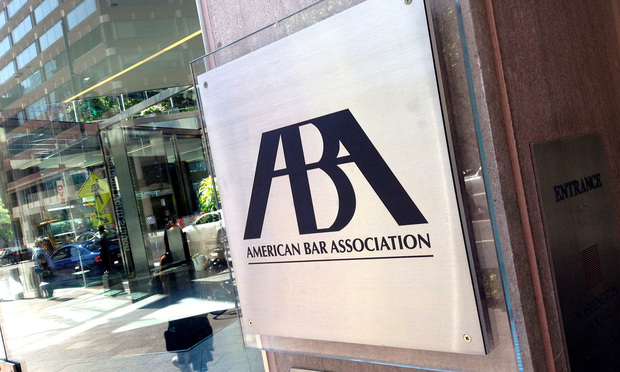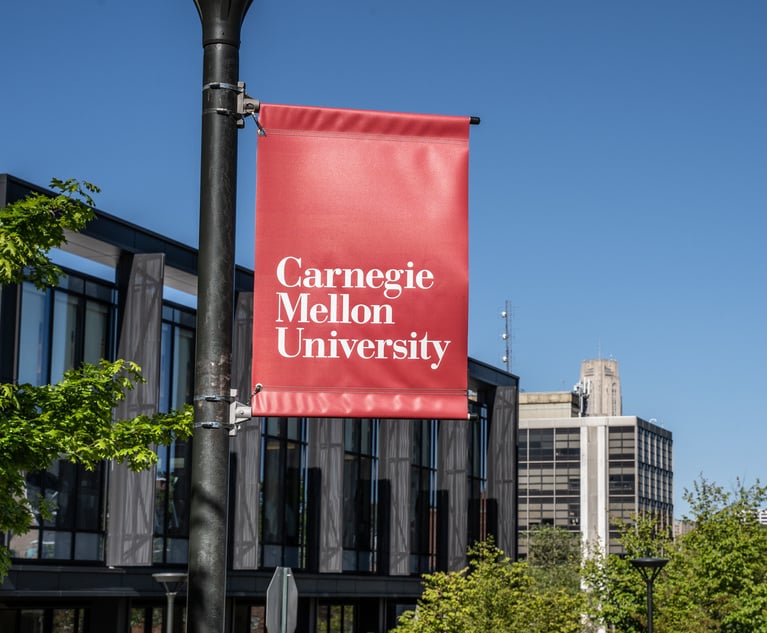As US Law Schools See First Real Enrollment Gains Since 2010, Most Pa. Schools Keep Pace
Nationwide, first-year law student enrollment is up 3 percent, fueling hope that legal education's fortunes are turning around after an eight-year slump.
December 19, 2018 at 11:29 AM
6 minute read
The original version of this story was published on Law.com
 Photo: Diego M. Radzinschi
Photo: Diego M. Radzinschi
Overall new student enrollment at the nation's law schools increased 3 percent this fall, according to figures released by the American Bar Association on Dec. 14, and the majority of Pennsylvania law schools saw gains either at or above the national average.
The 3 percent jump nationwide represents the first measurable increase in the size of the first-year class since 2010—when new enrollment peaked at more than 52,000. The number of new law students at ABA-accredited law schools fell 29 percent between 2010 and 2015, before leveling off at about 37,000 for the next three years. This fall, 38,390 new students showed up on campus, which is 1,070 more than the previous year.
Duquesne University School of Law in Pittsburgh saw the biggest enrollment bump of any Pennsylvania school, growing its 2018 first-year class to 188 students from 148 students a year ago—an increase of more than 27 percent.
Penn State's two law schools—Penn State Law in University Park and Dickinson Law in Carlisle—saw the second- and fourth-highest enrollment gains for Pennsylvania law schools this fall, at nearly 7 percent (119 students to 127) and 4 percent (73 students to 76), respectively.
Villanova University Charles Widger School of Law took the third spot, with enrollment growth of 5 percent (175 to 183 students).
Meanwhile, University of Pennsylvania Law School grew enrollment by nearly 3 percent (244 students to 251), Drexel University Thomas R. Kline School of Law by 2 percent (151 students to 154) and Temple University's Beasley School of Law by about 1.5 percent (223 students to 226).
University of Pittsburgh School of Law and Widener University Commonwealth Law School, on the other hand, were the only Pennsylvania law schools to see enrollment drop this fall. Pitt Law's enrollment decreased by just under 8 percent (141 students to 130) and Widener Commonwealth's enrollment dropped by nearly 9 percent (128 students to 117).
In a statement, Pitt Law Dean Amy Wildermuth said the class size decrease was intentional, ”as part of a multi-year, data-driven plan that reflects a deep investment from, and partnership with, the provost and chancellor of the University of Pittsburgh.”
“The plan takes into account data that we have collected around, among other things, the anticipated career opportunities for our grads both regionally and nationally in an ever-changing market; the qualities that produce the most successful grads of Pitt Law; and the requirements for delivering the best, cutting-edge legal education and experiences for our students,” Wildermuth said in the statement. “At a smaller size, we believe we will be better able to fulfill our promise to our graduates that that they will have the kinds of career opportunities that they expected when selecting Pitt Law. A reduction in our class size also allows us to focus our selection process to ensure we are able to attract the best-qualified candidates for Pitt Law.”
Wildermuth also said lower enrollment would allow for smaller class sizes and more personalized education as the school seeks to institute a curriculum focused on preparing students “to understand and use technology to their advantage, to be an effective team member on cross-discipline teams, to become expert decision-makers and problem-solvers, and to serve and engage deeply with their communities.”
John Benfield, associate dean of admissions and administration at Widener Law Commonwealth, meanwhile, noted in an emailed statement that, while this year's enrollment decreased as compared to last year, it's “still way up from the numbers for the entering class in 2015, 2014, and 2013.”
“It is important to note that the increase class size from fall 2015 to fall 2016 was approximately 62 percent,” Benfield said. “This increase in class size was done while also maintaining and protecting the class profile, median LSAT and GPA. For fall 2017, the entering class was again increased while protecting the profile. In fall 2018, the class size was reduced, but again the profile was maintained. While much was reported of the increased applications for 2018, a closer look at the pool of applicants shows that the increase in test takers and applicants occurred at the upper LSAT percentiles.”
The nationwide enrollment boost is welcome news for legal academics, who for years have hoped in vain for a turnaround in legal education's fortunes. Waning interest in a law degree forced many schools to reduce the size of their faculties and make other cutbacks. Five schools have closed in recent years or will soon shut down.
The 3 percent increase in new law students this year isn't unexpected. Applicants to law school surged 8 percent last year, according to the Law School Admission Council, fueling speculation that law school is once again a hot ticket. The Trump administration and discord in Washington are contributing to the added interest in legal education, according to deans and admissions officers.
Some schools appear to have utilized the larger applicant pool as an opportunity to be more selective about the students they admit, said Jerome Organ, a professor at the University of St. Thomas School of Law who studies enrollment trends. Put another way, schools opted to admit fewer students than they could have, given the increase in applicants in order to bring in classes with higher Law School Admission Test scores and undergraduate grades, he said.
Still, the boost in applicants caught some law schools by surprise. Some ended up with larger 1L classes than intended, which is a reversal from the days when admissions offices were scrambling to fill up seats. More than half of schools—122—reported an increase in the size of their first-year class, while 81 schools told the ABA that their 1L class is smaller than in 2017.
It's not just J.D. programs that gained in popularity this year. Enrollment in non-J.D. programs, which includes LL.M. and masters programs, grew more than 8 percent from 2017.
This content has been archived. It is available through our partners, LexisNexis® and Bloomberg Law.
To view this content, please continue to their sites.
Not a Lexis Subscriber?
Subscribe Now
Not a Bloomberg Law Subscriber?
Subscribe Now
NOT FOR REPRINT
© 2025 ALM Global, LLC, All Rights Reserved. Request academic re-use from www.copyright.com. All other uses, submit a request to [email protected]. For more information visit Asset & Logo Licensing.
You Might Like
View All
Sanctioned Penn Law Professor Amy Wax Sues University, Alleging Discrimination
5 minute read
Pa. Superior Court: Sorority's Interview Notes Not Shielded From Discovery in Lawsuit Over Student's Death
3 minute read
LSAT Administrator Sues to Block AI Tutor From Using ‘Famous, Distinctive’ Test Prep Materials
3 minute read
Disjunctive 'Severe or Pervasive' Standard Applies to Discrimination Claims Against University, Judge Rules
5 minute readTrending Stories
- 1SDNY Criminal Division Deputy Chief Returns to Debevoise
- 2Brownstein Adds Former Interior Secretary, Offering 'Strategic Counsel' During New Trump Term
- 3Tragedy on I-95: Florida Lawsuit Against Horizon Freight System Could Set New Precedent in Crash Cases
- 4Weil, Loading Up on More Regulatory Talent, Adds SEC Asset Management Co-Chief
- 5Big Banks Did Great Last Year. What Does That Mean for Big Law?
Who Got The Work
J. Brugh Lower of Gibbons has entered an appearance for industrial equipment supplier Devco Corporation in a pending trademark infringement lawsuit. The suit, accusing the defendant of selling knock-off Graco products, was filed Dec. 18 in New Jersey District Court by Rivkin Radler on behalf of Graco Inc. and Graco Minnesota. The case, assigned to U.S. District Judge Zahid N. Quraishi, is 3:24-cv-11294, Graco Inc. et al v. Devco Corporation.
Who Got The Work
Rebecca Maller-Stein and Kent A. Yalowitz of Arnold & Porter Kaye Scholer have entered their appearances for Hanaco Venture Capital and its executives, Lior Prosor and David Frankel, in a pending securities lawsuit. The action, filed on Dec. 24 in New York Southern District Court by Zell, Aron & Co. on behalf of Goldeneye Advisors, accuses the defendants of negligently and fraudulently managing the plaintiff's $1 million investment. The case, assigned to U.S. District Judge Vernon S. Broderick, is 1:24-cv-09918, Goldeneye Advisors, LLC v. Hanaco Venture Capital, Ltd. et al.
Who Got The Work
Attorneys from A&O Shearman has stepped in as defense counsel for Toronto-Dominion Bank and other defendants in a pending securities class action. The suit, filed Dec. 11 in New York Southern District Court by Bleichmar Fonti & Auld, accuses the defendants of concealing the bank's 'pervasive' deficiencies in regards to its compliance with the Bank Secrecy Act and the quality of its anti-money laundering controls. The case, assigned to U.S. District Judge Arun Subramanian, is 1:24-cv-09445, Gonzalez v. The Toronto-Dominion Bank et al.
Who Got The Work
Crown Castle International, a Pennsylvania company providing shared communications infrastructure, has turned to Luke D. Wolf of Gordon Rees Scully Mansukhani to fend off a pending breach-of-contract lawsuit. The court action, filed Nov. 25 in Michigan Eastern District Court by Hooper Hathaway PC on behalf of The Town Residences LLC, accuses Crown Castle of failing to transfer approximately $30,000 in utility payments from T-Mobile in breach of a roof-top lease and assignment agreement. The case, assigned to U.S. District Judge Susan K. Declercq, is 2:24-cv-13131, The Town Residences LLC v. T-Mobile US, Inc. et al.
Who Got The Work
Wilfred P. Coronato and Daniel M. Schwartz of McCarter & English have stepped in as defense counsel to Electrolux Home Products Inc. in a pending product liability lawsuit. The court action, filed Nov. 26 in New York Eastern District Court by Poulos Lopiccolo PC and Nagel Rice LLP on behalf of David Stern, alleges that the defendant's refrigerators’ drawers and shelving repeatedly break and fall apart within months after purchase. The case, assigned to U.S. District Judge Joan M. Azrack, is 2:24-cv-08204, Stern v. Electrolux Home Products, Inc.
Featured Firms
Law Offices of Gary Martin Hays & Associates, P.C.
(470) 294-1674
Law Offices of Mark E. Salomone
(857) 444-6468
Smith & Hassler
(713) 739-1250





